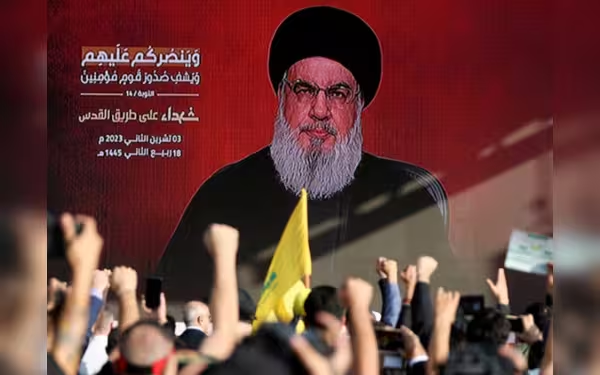Saturday, November 16, 2024 07:26 PM
Israel's Targeting of Hassan Nasrallah: A Strategic Analysis
- Israeli forces allegedly targeted Hassan Nasrallah with MK 84 missile.
- Skepticism surrounds claims of a fortified underground headquarters.
- Military actions could escalate tensions in the Middle East.
 Image Credits: en.dailypakistan.com.pk
Image Credits: en.dailypakistan.com.pkThe alleged targeting of Hassan Nasrallah by Israel raises questions about military tactics and regional stability.
The recent developments surrounding the alleged assassination of Hezbollah leader Hassan Nasrallah have sparked intense discussions among defense analysts in the Middle East. This incident has raised questions about the tactics employed by the Israeli military and the implications of such actions on regional stability. Reports suggest that the Israeli forces targeted Nasrallah using the MK 84 missile, a weapon known for its significant destructive capabilities. However, the narrative presented by Israeli media, which claimed the existence of a 14-story underground headquarters, has been met with skepticism by experts in the field.
Defense analysts have pointed out that the claims regarding the underground facility lack credible evidence. They argue that the portrayal of Nasrallah's location as a fortified stronghold may be more of a strategic narrative than a reflection of reality. This skepticism is crucial, as it highlights the importance of verifying information in a region where misinformation can lead to escalated tensions.
The MK 84 missile, utilized in the strike, is designed to deliver a powerful blow, capable of causing extensive damage. Its use in this context raises further questions about the Israeli military's operational strategies and the potential consequences of such high-stakes actions. The decision to employ such a weapon against a high-profile target like Nasrallah indicates a significant escalation in military tactics, which could have far-reaching implications for the already volatile situation in the Middle East.
As the dust settles on this incident, it is essential to consider the broader implications of military actions in the region. The targeting of leaders like Nasrallah not only affects the immediate parties involved but also influences the dynamics of power and conflict in the Middle East. The ongoing cycle of violence and retaliation can lead to a precarious situation, where the potential for further conflict looms large.
The situation surrounding Hassan Nasrallah's alleged assassination serves as a stark reminder of the complexities of Middle Eastern geopolitics. As analysts continue to dissect the events, it becomes increasingly clear that understanding the motivations and strategies of all parties involved is crucial for anyone seeking to grasp the intricacies of this enduring conflict. The need for accurate information and thoughtful analysis has never been more pressing, as the region navigates through these turbulent waters.













